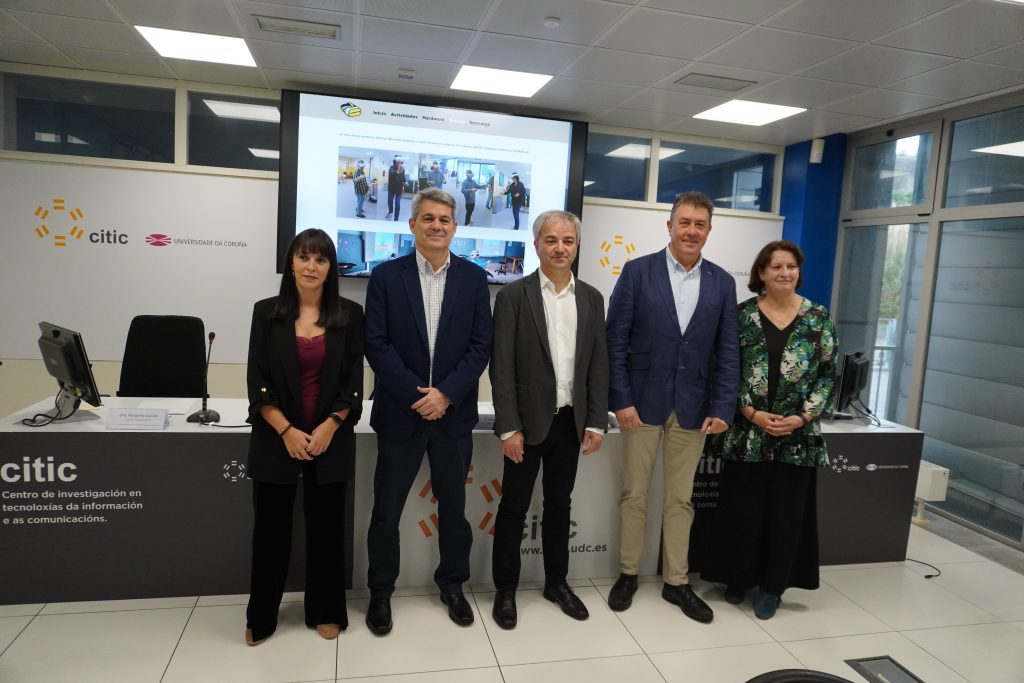
Virtual reality contributing to the well-being and cognitive improvement of the elderly and people with intellectual disabilities
- CITIC hosted the presentation of the Atendis-VR project this Friday, driven by the UDC’s own ICT Center and the ADCOR Foundation—dedicated to the care of people with disabilities—with the support of the Galician Innovation Agency.
- The Initiative, available for Meta Quest devices (virtual reality glasses) and others compatible with OpenXR, is aimed at the cognitive stimulation of the elderly and people with intellectual disabilities.
A Coruña, October 11, 2024.– The Center for Research in Information and Communication Technologies (CITIC) of the University of A Coruña (UDC) hosted the presentation of the Atendis-VR project this Friday, an innovative virtual reality initiative developed over the past year and aimed at the cognitive stimulation of the elderly and people with intellectual disabilities. This project has been carried out by the ADCOR Foundation with the support of CITIC, and funded by the Galician Innovation Agency through the InnovaPeme 2023 program. It is an initiative with which CITIC reinforces its “commitment to making technology accessible to everyone, which involves developing accessible and inclusive solutions, ensuring that technological tools like ATENDIS-VR are within everyone’s reach,” said the center’s deputy director, Javier Pereira.
Atendis-VR is an advanced cognitive stimulation solution through virtual reality, specifically designed for Meta Quest 2 and 3 devices, benefiting more than 100 users. The project proposes an interactive game with seven different activities, each adapted to users and with difficulty levels that allow working on different physical-cognitive aspects. These activities offer an immersive and enriching experience that contributes to the well-being and cognitive improvement of the elderly and those with intellectual disabilities.
The presentation event featured the participation of Pablo Martín Lancharro, Deputy Director General of Social and Health Care and Assistance Innovation of the Department of Social Policy and Equality, and Juan Ignacio Borrego, Councilor for Education, Training, and Technological Innovation of the A Coruña City Council, along with Margarita Garrido, manager of ADCOR, and Betania Groba, principal investigator of the project.
During the event, ADCOR users supported by the entity’s technicians and computer engineer Iago Fernández conducted a live demonstration of the Atendis-VR application, testing different virtual reality scenarios and showcasing the system’s versatility. The day ended with a guided tour of CITIC’s facilities, where attendees explored various technological spaces, including a technology demonstrator room, augmented reality glasses, robots like the robot dog and companion Tiago, and a 3D printing workshop.
Innovation in physical-cognitive skills
The Atendis-VR project is an innovative program consisting of seven activities designed to work on different physical-cognitive skills, with adaptable difficulty levels. Among the activities are “Velutina Plague,” where users must aim and eliminate virtual wasps, and “RC Car,” which involves maintaining the correct distance with a guide vehicle on a circuit. It also includes the “Monument Puzzle,” where historical miniatures are assembled, and the “Marble Circuit,” which challenges users to complete a circuit by placing pieces in their place.
Additionally, the project incorporates adaptations of traditional games such as “Chave” and bowling, where aim and coordination are improved by knocking down pillars and pins, respectively. The “Balloons” activity allows users to touch moving balloons to pop them, improving their stability and reflexes.
Download available
Atendis-VR is available for direct download through the official link: Download_Atendis-VR. The application is primarily designed for Meta Quest 2 and 3 devices but is also compatible with any device that meets the OpenXR standard.
For more information about the project or to access the application, you can visit the project’s website: https://talionis.citic.udc.es/atendisvr/





